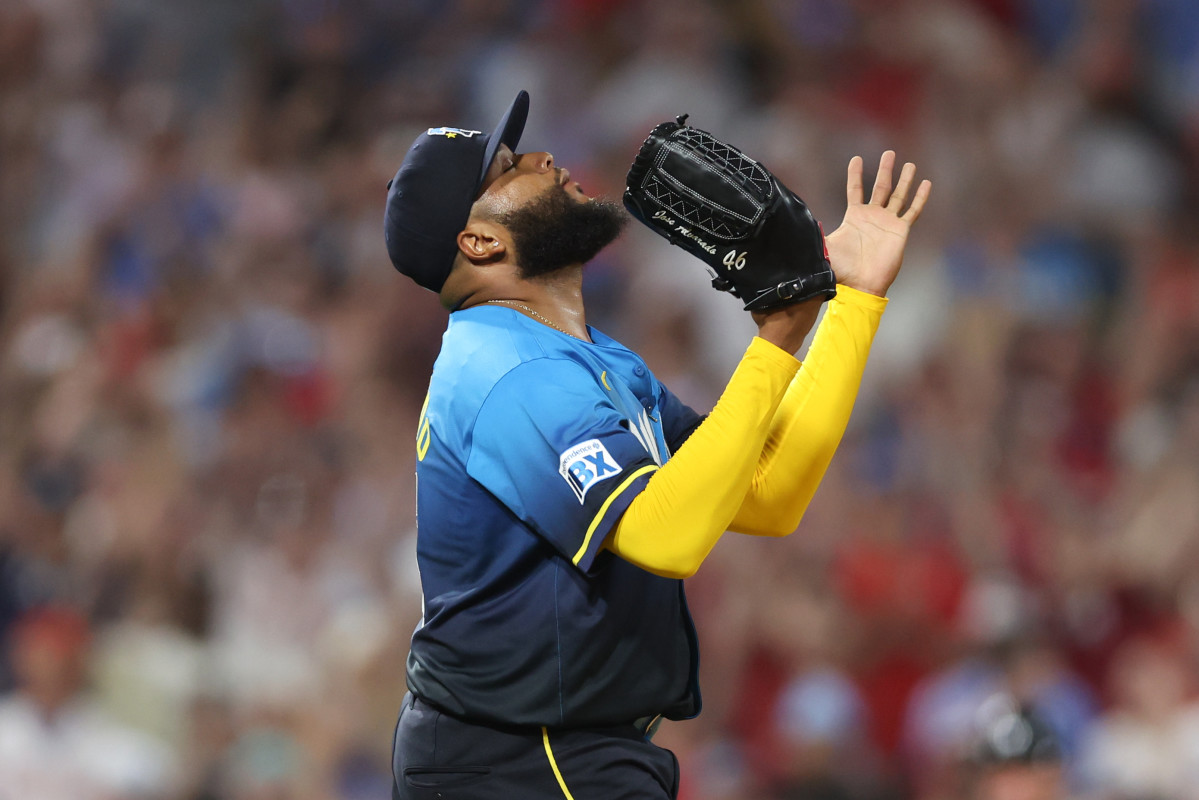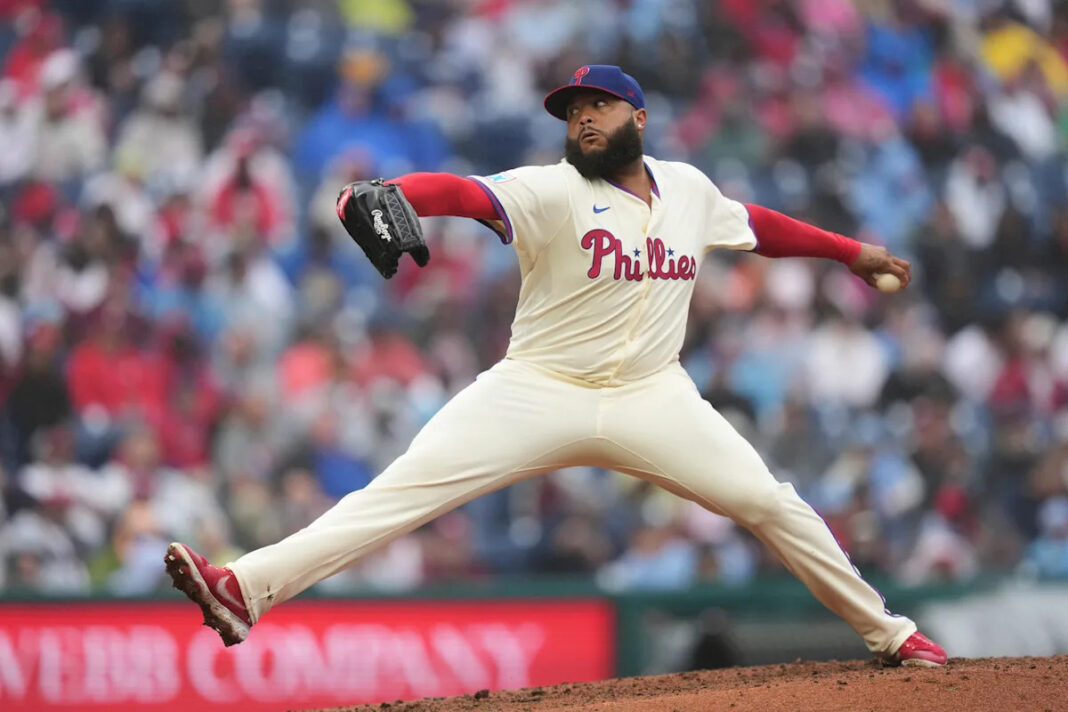The Philadelphia Phillies’ bullpen, once a source of strength, now faces a daunting reality: 80 games without José Alvarado. The hard-throwing lefty, known for his electric presence on the mound and swing-and-miss stuff, has been suspended after testing positive for a performance-enhancing drug. This news sends shockwaves through the baseball community, raising questions about the future of the team and the consequences of violating the league’s integrity.
Phillies’ Postseason Hopes Derailed: Analyzing Alvarado’s Suspension
The Fallout: Impact on the Phillies’ Season

The 80-game suspension handed down to Philadelphia Phillies closer José Alvarado immediately throws a wrench into the team’s postseason aspirations. Alvarado’s absence leaves a gaping hole in the bullpen, one that could be particularly damaging in tight, late-inning situations crucial for success in October.
Immediate Impact: Examining the immediate void left by Alvarado’s absence in the bullpen and its potential to affect close games.
Alvarado was the Phillies’ most reliable reliever in a bullpen that, prior to his suspension, ranked fourth-worst in the National League with a 4.66 ERA and eight blown saves. His absence will undoubtedly put increased pressure on the remaining relievers, particularly in high-leverage situations.
The Phillies will need to rely on a combination of Jordan Romano, Tanner Banks, and Matt Strahm to fill the void left by Alvarado. However, each of these pitchers has its own set of strengths and weaknesses, and it remains to be seen if they can collectively replicate Alvarado’s dominant performance as the closer. Romano, for example, struggled early in the season when he initially served as the closer.
Long-Term Implications: Analyzing the long-term consequences for the Phillies’ playoff aspirations, especially considering the crucial role a reliable closer plays in postseason success.
A reliable closer is often the difference between winning and losing in a tight postseason series. The Phillies, currently 1.5 games behind the New York Mets in the National League East, are firmly in the playoff hunt. Losing Alvarado for the majority of the regular season and potentially the entire postseason could prove to be a fatal blow to their chances of reaching the World Series.
The Phillies’ front office now faces a critical decision: try to find a replacement closer on the trade market or promote a prospect from the minor leagues. Both options come with risks, and the team will need to carefully weigh the pros and cons before making a move.
Bullpen Depth Charts: Exploring potential replacements for Alvarado and the strengths and weaknesses of each candidate.
The Phillies’ bullpen depth charts will likely undergo significant changes in the wake of Alvarado’s suspension.
- Jordan Romano: Romano, who struggled earlier in the season as the closer, may be given another shot at the role. However, his 7.71 ERA raises concerns about his ability to consistently perform under pressure.
- Tanner Banks: Banks has shown promise as a left-handed reliever, but he lacks the experience and track record of Alvarado. He could be an effective setup man, but his ability to close games remains to be seen.
- Matt Strahm: Strahm has been a valuable member of the bullpen, but he has primarily served as a setup man. While he possesses the necessary stuff to close, it’s unclear if he has the mental fortitude to handle the pressure of the role.
The Phillies may also look to promote prospects from the minor leagues to bolster their bullpen. However, it’s important to note that calling up young players to the major leagues can be a risky proposition, as they may not be ready for the demands of big-league pitching.

The Substance: Understanding the PED Violation
The specific substance that led to Alvarado’s suspension, exogenous Testosterone, is a performance-enhancing drug that can increase muscle mass, strength, and energy levels. Its use is strictly prohibited by Major League Baseball’s Joint Drug Prevention and Treatment Program.
Alvarado’s 80-game suspension reflects the severity of his violation. This punishment serves as a reminder of the league’s commitment to upholding the integrity of the game and ensuring a level playing field for all athletes.
The news of Alvarado’s suspension has sent shockwaves through the baseball world, prompting widespread discussion and debate. Some analysts have argued that the suspension is too lenient, while others have expressed sympathy for Alvarado, acknowledging the possibility of unintentional ingestion of a banned substance.
Regardless of the circumstances surrounding Alvarado’s positive test, the consequences are clear. He will miss a significant portion of the season, and his career with the Phillies is now in jeopardy. Alvarado’s story serves as a cautionary tale for all athletes, emphasizing the importance of being aware of the potential risks associated with performance-enhancing drugs.
Details of the Violation: A Clear Overview of the Specific Substance Involved and its Implications within the Context of MLB’s PED Policy
Philadelphia Phillies closer José Alvarado has been suspended for 80 games by Major League Baseball after failing a performance-enhancing drug test. The substance involved in the violation is exogenous Testosterone, a type of anabolic steroid.
According to MLB’s Joint Drug Prevention and Treatment Program, the use of performance-enhancing substances, including exogenous Testosterone, is strictly prohibited. The program aims to prevent the use of these substances and ensure that players compete fairly and safely.
The 80-game suspension is the penalty for a first-time offender under MLB’s PED policy. A second violation would draw a 162-game suspension, and a third results in a lifetime ban from the sport.
Exogenous Testosterone is a synthetic form of the male hormone testosterone, which can be used to enhance muscle mass and athletic performance. The use of this substance is considered a serious offense in professional sports, as it can provide an unfair advantage and pose health risks to the user.
The implications of Alvarado’s suspension are significant, not only for the Phillies but also for the entire baseball community. The suspension serves as a reminder of the importance of fair play and the consequences of violating the rules.
Alvarado’s suspension will not only impact his career but also affect the Phillies’ performance in the season. The team will need to find a replacement for their closer, which could be a challenging task, especially with the suspension lasting for 80 games.
First-Time Offender: Assessing the Severity of an 80-Game Suspension for a First-Time Violation and How this Penalty Compares to Previous Cases
The 80-game suspension is a significant penalty for a first-time offender, and it is essential to understand the context and implications of this decision.
Historically, MLB has imposed varying penalties for PED-related offenses. In 2014, the league suspended Alex Rodriguez for 211 games, while Ryan Braun was suspended for 65 games in 2013.
However, in recent years, the league has become more lenient in its approach to PED-related offenses. In 2020, the league suspended Colorado Rockies player Trevor Story for 80 games, which is the same penalty imposed on Alvarado.
The severity of the penalty depends on various factors, including the type of substance involved, the player’s level of experience, and the timing of the offense. In Alvarado’s case, the 80-game suspension is a fair penalty, considering it is his first offense and the substance involved is a performance-enhancing substance.
It is worth noting that the suspension will not only impact Alvarado’s career but also affect the Phillies’ performance in the season. The team will need to find a replacement for their closer, which could be a challenging task, especially with the suspension lasting for 80 games.
The Phillies’ front office will need to assess the situation carefully and make a decision that benefits the team. They may choose to promote a player from the minor leagues or sign a free agent to fill the gap left by Alvarado.
Alvarado’s Response: Reporting on Any Statements or Explanations Provided by Alvarado Regarding the Violation
So far, Alvarado has not made any public statements regarding the violation or the suspension. The Phillies’ statement on Alvarado’s suspension is the only public comment from the team.
The team’s statement reads: “The Phillies fully support Major League Baseball’s Joint Prevention and Treatment Program and are disappointed to hear today’s news of Jose’s violation.”
It is unclear whether Alvarado will make a statement in the future, but it is essential for the player to take responsibility for his actions and provide a clear explanation for the violation.
Alvarado’s response will be crucial in determining the team’s next steps. If he takes responsibility for his actions and provides a clear explanation, the team may be more likely to support him and work towards finding a solution.
However, if Alvarado fails to take responsibility or provides a vague explanation, the team may choose to take a harder stance and consider further action.
The Future: Alvarado’s Contract and the Phillies’ Next Steps
Contractual Implications: Analyzing How the Suspension Might Affect the Phillies’ Decision Regarding Alvarado’s Club Option for the Following Season
Alvarado is in the final year of a three-year, $22 million contract. He has a $9 million club option for next season, but the suspension may affect the Phillies’ decision-making.
The team may choose to exercise the option, considering Alvarado’s performance before the suspension. However, the suspension and the subsequent loss of a valuable player may lead the team to reconsider their decision.
The Phillies’ front office will need to assess the situation carefully and make a decision that benefits the team. They may choose to exercise the option, sign Alvarado to a new contract, or let him become a free agent.
Front Office Decisions: Discussing Potential Moves the Phillies Could Make to Bolster Their Bullpen, Including Potential Trades or Free-Agent Signings
The Phillies will need to make significant changes to their bullpen to compensate for Alvarado’s absence. The team may choose to promote a player from the minor leagues, sign a free agent, or make a trade to bolster their bullpen.
Potential targets include Jordan Romano, Tanner Banks, or Matt Strahm. The team may also consider signing a free agent, such as a closer or a setup reliever, to fill the gap left by Alvarado.
The Phillies’ front office will need to assess the market carefully and make a decision that benefits the team. They may choose to make a trade, sign a free agent, or promote a player from the minor leagues.
Team Culture: Reflecting on the Impact of this Incident on the Phillies’ Team Culture and the Organization’s Commitment to Upholding Integrity within the Sport
The suspension of Alvarado has significant implications for the Phillies’ team culture. The incident highlights the importance of fair play and the consequences of violating the rules.
The organization’s commitment to upholding integrity within the sport is essential for maintaining a positive team culture. The Phillies’ front office will need to take a strong stance on the issue and ensure that the team’s values and principles are upheld.
The team’s response to the incident will be crucial in determining the impact on the team culture. If the team takes a strong stance and upholds its values, the incident may have a positive impact on the team culture.
However, if the team fails to address the issue or takes a lenient stance, the incident may have a negative impact on the team culture.
Next Steps: The Phillies’ Decision-Making Process and Potential Consequences
The Phillies’ front office will need to assess the situation carefully and make a decision that benefits the team. They may choose to exercise the option, sign Alvarado to a new contract, or let him become a free agent.
The team’s decision will have significant implications for the team’s performance in the season. If the team chooses to exercise the option or sign Alvarado to a new contract, the team may be able to maintain its competitive edge.
However, if the team chooses to let Alvarado become a free agent, the team may struggle to find a suitable replacement for their closer. The team’s decision will be crucial in determining the team’s success in the season.
The Phillies’ front office will need to take a strong stance on the issue and ensure that the team’s values and principles are upheld. The team’s response to the incident will be crucial in determining the impact on the team culture.
The team’s decision will have significant implications for the team’s performance in the season. The Phillies’ front office will need to assess the situation carefully and make a decision that benefits the team.
Conclusion
José Alvarado’s 80-game suspension casts a long shadow over the Phillies’ playoff aspirations. His absence leaves a gaping hole in the team’s bullpen, a unit that has been a cornerstone of their recent success. Alvarado’s talent and electrifying performances on the mound were undeniable, and his loss will undoubtedly be felt both on the field and in the clubhouse. The circumstances surrounding the suspension, involving a performance-enhancing drug, raise further questions about the integrity of the game and the pressures placed upon athletes to achieve at any cost. This incident serves as a stark reminder of the delicate balance between athletic ambition and ethical conduct. The implications extend beyond the Phillies organization, impacting the league’s efforts to maintain a level playing field and protect the integrity of the sport. As fans and observers, we are left to ponder the consequences of Alvarado’s actions and the broader implications for the future of baseball. Will this case serve as a catalyst for greater transparency and accountability within the sport? Or will it simply become another chapter in a long and ongoing debate about performance enhancement and its role in professional athletics? The answers to these questions remain to be seen.

